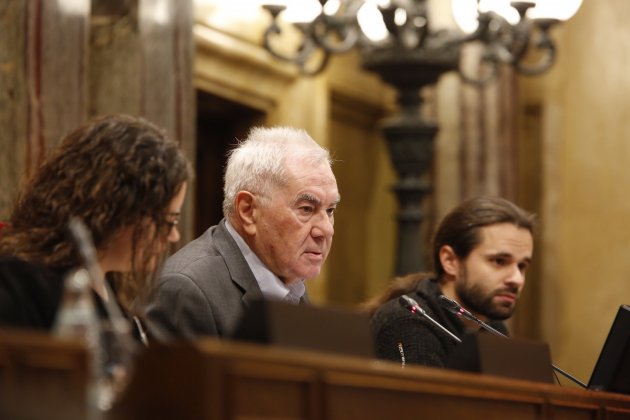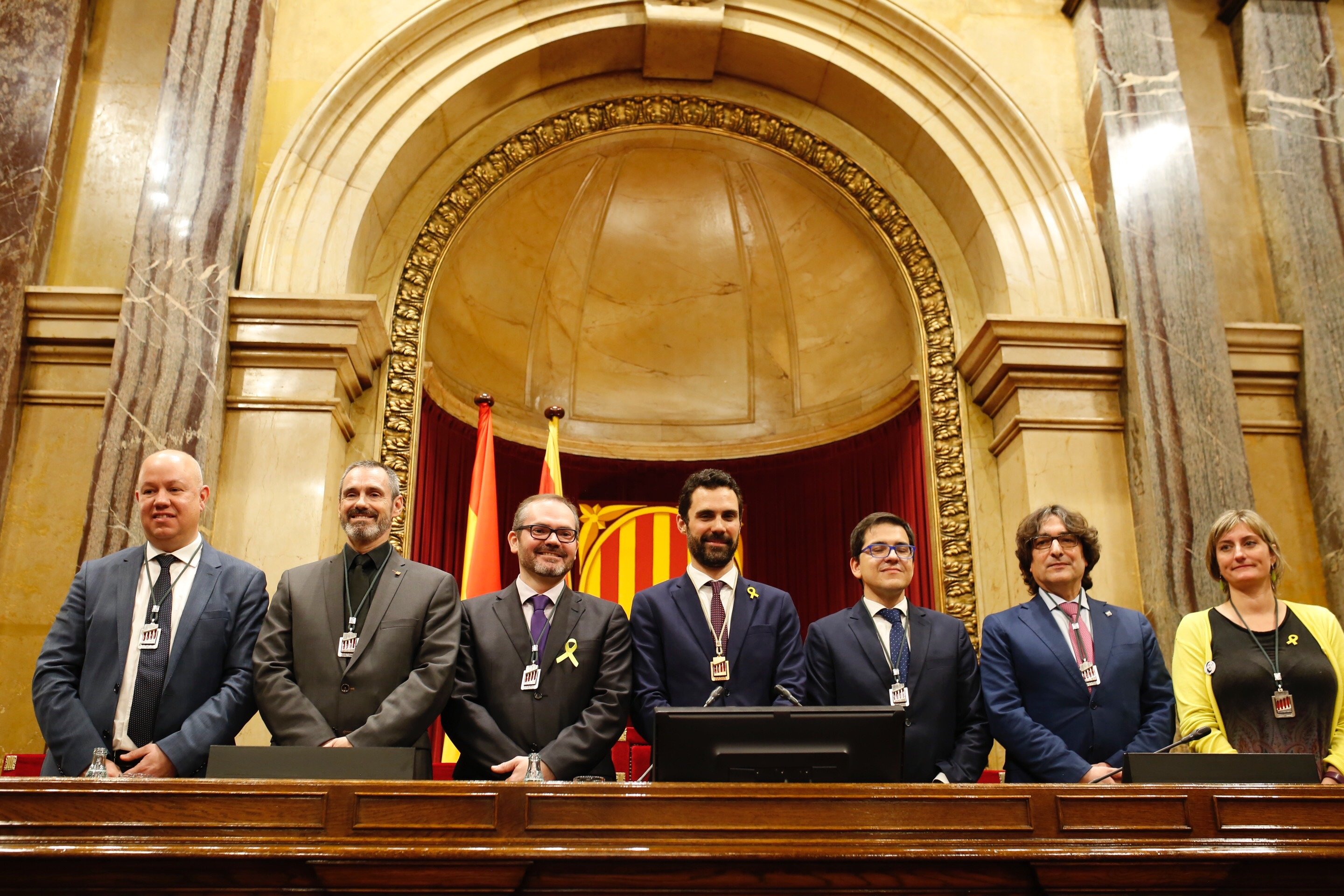After the Spanish prime minister, Mariano Rajoy, dissolved the Catalan Parliament on 27th October last year, pro-independence parties have now, this morning, regained control of the chamber. They did so by placing ERC deputy Roger Torrent at the chamber's head, as its new speaker, with the support of the 65 votes they from those of the JuntsxCat, ERC and CUP deputies present and thanks to the votes delegated to proxies by the three imprisoned deputies. Moreover, they did so without tension. Torrent made several calls in his speech for the recovery of politics and the Catalan institutions and to "mend Catalan society" and seek an understanding, whilst the pro-independence parties even decided to not ask for permission to delegate the votes of the deputies in exile to avoid stirring up the debate.
"As far it depends on me, I will work tirelessly so that, during this legislature, politics returns to the centre of everything. To recover the country's institutions. Let's work together to recover the institutions and put them in the hands of the citizens," said Torrent.
The speaker denounced the empty seats belonging to the three deputies "absolutely unjustifiably" in preventive detention and to the five in exile, saying that the situation has to be brought to an end, but also committed to looking for understanding. "Above convictions there are principles, and I want to make democracy and coexistence the fundamental pillars of my mandate," he said.
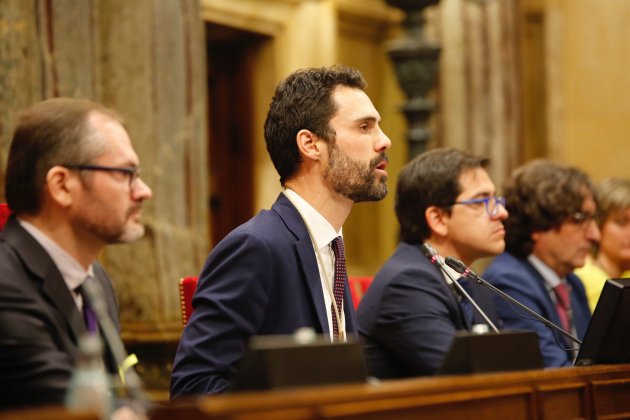
The effect of Torrent's speech was clear on the statements from the groups who paraded through the press room after the debate. Left-wing, pro-independence CUP was critical of his words, especially for not having referred to the 1st October independence referendum. "That speech wasn't going in the right direction to make the republic a reality", said their leader, Carles Riera, who suggested the speech fit more within the current autonomous community model.
On the other hand, the leader of unionist Ciutadans, Inés Arrimadas, expressed no criticism of the Torrent's speech, focusing on denouncing comments from the head of the temporary "Mesa d'edat" which ran the session, Ernest Maragall. Moreover, when explicitly asked to comment on the desire for consensus expressed by the new speaker, Arrimadas avoided evaluating his speech today and referred to previous statements he had made to say that her party has little hope of a real wish for consensus taking shape.
This wish for agreement was positively received, however, by both the spokesperson for the centre-left, pro-union PSC, Eva Granados, and the leader of left-wing Catalunya En Comú-Podem, Xavier Domènech.
In fact, this time PSC were worried about distancing themselves from the hardline positions taken by Cs and PP during the debate. When Arrimadas was protesting in the chamber over the decision to accept proxy votes for the imprisoned ministers and asking for reconsideration, PSC's leader, Miquel Iceta, spoke to express his support for the decision which he considers backed by pronouncements from Spain's Supreme Court and the chamber's lawyers.
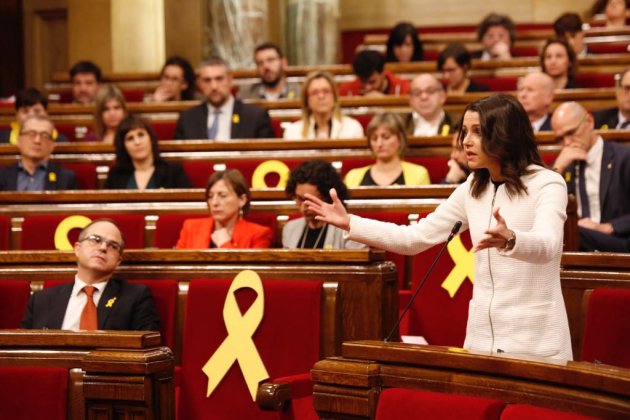
The votes also revealed a small crack in the unionist front. With Torrent having received unanimous support from the pro-independence seats, his Ciutadans rival, José María Espejo Saavedra, despite having the agreed support of his party, PSC and PP, had one unionist deputy abstain from voting for him. This deputy did so, moreover, in both rounds of voting for the speaker.
The absence of the imprisoned and exiled deputies was ever present. From the start of the debate, in the empty seats corresponding to the president of the JuntsxSí candidacy and the absent ERC deputies were yellow loops, the common symbol of support for them. Meanwhile, the seats for the government were also empty, although normally they would be filled by the outgoing president and ministers.
The deputies, many of whom were wearing yellow loops themselves, also showed their support for the imprisoned and exiled deputies with applause each time one of their names was called to vote. The vote followed the normal procedure in the Catalan Parliament, of calling each deputy up by name, one-by-one, to place their vote in a ballot box. This took place four times. Twice to choose the speaker, by a simple majority in the second round, once for the deputy speakers and a final time for the secretaries. Each time, the same homage to their absent colleagues.
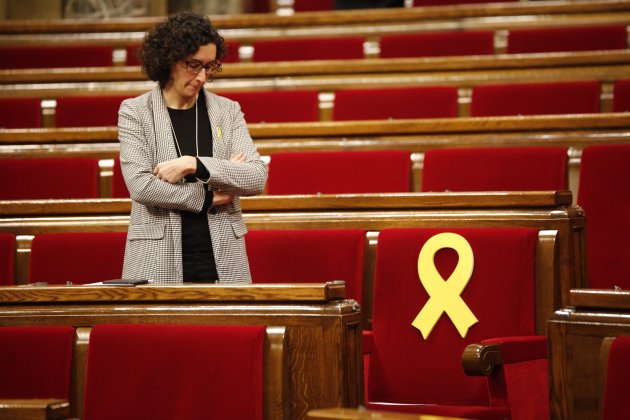
The session started at 11am with the forming of the Mesa d'edat "Board of age", incorporating the oldest and two youngest deputies in the Parliament.
Unlike the normal situation in the constitution debate, always centred on the new speaker's speech, the heart of this morning's controversy was focused on the Mesa d'edat. Not only because they decided to accept proxy votes for the imprisoned deputies, to the criticism of part of the opposition, but also for the strength of the speech from the oldest deputy. Maragall aroused the unionist seats saying that, on 1st October last year, "the public became master of its destiny", before concluding his speech with the slogan "this country will always be ours". This was the only moment of protest seen in the chamber.
